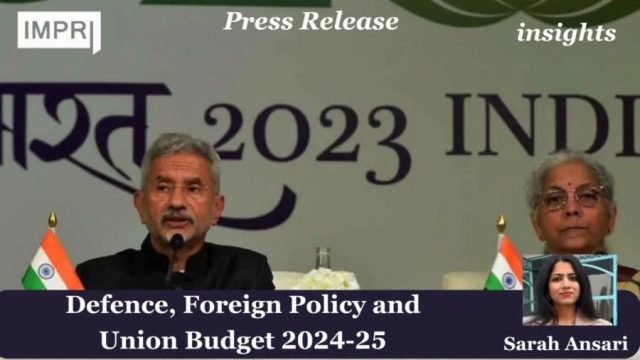Press Release
Sarah Ansari
Concluding IMPRI’s 5th Annual Series of Thematic Deliberations and Analysis of Union Budget FY 2024-25 on 29th July 2024, a pivotal discussion exploring Union Budget 2024 and its profound implications on Defence and Foreign Policy was organised. The session revolved around themes of analysis and justification of the budget allocations to the defence ministry, Atmanirbhar Bharat and its achievement, and India’s mission of being the “VishwaBandhu” in global politics.
It was chaired by Professor Simi Mehta (CEO & Editorial Director, IMPRI), who emphasised the need to view the budget in a global context.
In the Union Budget for FY 2024-25, The Finance Minister allocated 6.21 lakh crore rupees towards the defence sector, the highest compared to all other ministries and 13.04% of the overall government expenditure. The allocation amounts to 1.9% of the projected GDP. This defence budget caters to providing security against the unstable geopolitical conditions such as the Israel-Hamas conflict.
The first panellist, Professor Sanjukta Bhattacharya (Retired Professor, International Relations, Jadavpur University, Kolkata; Visiting Professor, IMPRI) raised the question of the adequacy of the allotted defence budget in an increasingly complex neighbourhood, when countries like China and the USA spend amounts as high as $231.36 billion and $858 billion respectively on their defence ministries. However, keeping in mind India’s 3 key targets of being a developed economy by 2047, Aatamanirbhar Bharat and VishwaBandhu (friend of the world), Professor Bhattacharya highlighted that budget allocations to the Ministry of Defence or the Ministry of External Affairs should not be viewed in isolation, but rather in the context of these goals.
She states that the provision of funds to these departments will have a multiplier effect on the country’s GDP, employment generation and capital formation. For instance, a reduction in customs duties on gold, silver, and platinum, as presented in the current Union Budget, will lead to rationalisation and ease of trade. She also suggested capital allocation for new technology in our defence systems.
She also mentioned how the Ministry of External Affairs saw a 23%increase in its budgetary allocations since 2023, which is 0.4% of the total budget, against the recommended figure of 1%. Further, she suggested that to emerge as a global player, India needs a differentiated narrative and stronger efforts on the “Make in India” front. She also elucidated how the current budget swings in the direction of attaining the goal of being a “VishwaBandhu” with policies regarding neighbourhood aid, lines of credit to stabilize neighbourhoods and investments such as the Chabahar Port in Iran. However, she raised the issue of “capacity gaps” in the MEA as a cause of concern.
Amb Anil Trigunayat (Distinguished Fellow, Vivekananda International Foundation (VIF), New Delhi; Visiting Distinguished Fellow, IMPRI), talking about India’s foreign policy, suggested that while assisting other countries, we should focus on high-impact community projects and development projects that assist visibly, instead of going on gigantic projects which might lack in delivering mechanisms. He suggested various methods of adopting defence diplomacy, cultural diplomacy and diaspora diplomacy to match with countries such as China and their global influence.
Mr. Robinder N. Sachdev (President, The Imagindia Institute, New Delhi; Founder, The Lemonade Party) then took the floor to present his analysis of the budget. He claimed that while we do not anticipate any wars, we are still not preparing our military-industrial-technology complex fast enough for the 2030s. Taking budgetary lessons from the wars of today, he commented on the defence budget by saying that the budget will be helped by the establishment of a ₹1 lakh crore corpus for deep tech. Further, the shift towards a 10-year ICDP reflects a strategic move to ensure holistic military planning and capability building.
Commenting on this year’s MEA budget, he opined that given India’s focus on the Global South, it would have been useful to include some countries from the Pacific Islands and Latin America. He lauded the establishment of the Global Trade Promotion Body for MSMEs as it reflects India’s push to enhance its export capabilities. He also urged for an increase in defence exports.
Major Gen (Dr) P. K. Chakravorty (VSM (Retd), Strategic Thinker on Security Issues; Visiting Senior Fellow, IMPRI) further spoke about the need for defence exports. He suggested that by encouraging startups and the private sector to indulge in defence production, we can expect a significant increase in defence exports. He talked about striking a balance between indigenous and imported weapons. He further commented on “Agniveer” as a prioritisation of manpower in the army. He also highlighted the issue of ‘pensions’ occupying a sizeable portion of the defence budget and suggested for them to be a separate component of the budget.
Professor Swaran Singh (Professor and Chairperson, Centre for International Politics, Organization and Disarmament (CIPOD), Jawaharlal Nehru University (JNU), New Delhi) highlighted the focus of the budget on Frontier Infrastructure, due to which the defence budget for the Border and Roads Organisation has increased by 30% this year. Better infrastructure eases the mobility of armed forces. There has also been a 48% increase in the budget for the “ex-servicemen contributory help” scheme.
Talking about India’s foreign policy, he stated that neighbourhood peace, global south and Indians travelling abroad are the current priorities of the MEA (Ministry of External Affairs). He suggested that for India to emerge as a global power, our total assistance aid and driven partnership needs to increase.
Last but not the least, Dr Laxman Kumar Behera (Associate Professor, Special Centre for National Security Studies, Jawaharlal Nehru University (JNU), New Delhi) presented his views on the Union Budget. He raised the issue of procurements in the defence budget and suggested for simplification of said procurements and reforms in the organisational structures. He also suggested an increase in the budget for Research & Development projects across the country to move forward with the goal of self-reliance or “Aatmanirbharta”.
During their ending notes, the speakers highlighted the need for the maximisation of the country’s resources and potential and melting the modern and the archaic to help India realise its dream of Viksit Bharat@2047.
IMPRI’s 5th Annual Series of Thematic Deliberations and Analysis of Union Budget 2024-25
IMPRI’s 5th Annual Series of Thematic Deliberations and Analysis of Union Budget 2024-25
Watch the event at IMPRI #Web Policy Talk
Acknowledgement- This article was written by Sarah Ansari, Research Intern IMPRI



















